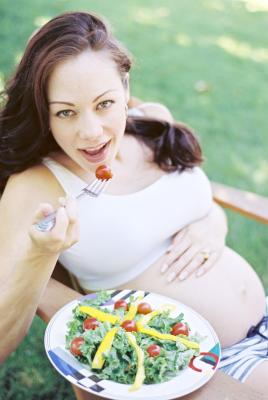If you are worried about your pregnancy diet, the first person you talk to should be your health care provider. She can address your specific concerns and highlight any special issues that you should keep in mind for your particular pregnancy. In general, though, a healthy pregnancy diet is like any healthy diet: You need a healthy mix of foods to get all the nutrients your body needs.
Time Frame
Ideally, a healthy pregnancy diet should start well before you become pregnant. That’s because your diet during the first trimester has a major impact on your baby’s fetal and long-term health and development, and you may not realize you’re pregnant for several weeks, says Eileen R. Fowles, assistant professor in the School of Nursing at the University of Texas at Austin, in the “Journal of Perinatal Education.”
Identification
According to the American Congress of Obstetricians and Gynecologists, a healthy pregnancy diet should include a mix of protein, carbohydrates, vitamins, minerals and fat. Specifically, pregnant women should consume at least 1,000 mg calcium, 27 mg iron, 770 mcg vitamin A, 85 mg vitamin C, 200 to 400 international units of vitamin D, 1.9 mg vitamin B6, 2.6 mcg vitamin B12 and 600 mcg folate.
Sources
Lean meats, poultry, beans, tofu and peanut butter are all good sources of protein. Opt for healthy whole-breads and cereals, rice, pasta, potatoes and vegetables for your calcium needs. Dairy products and bone-in salmon and sardines can provide calcium. Red meat, spinach, and iron-fortified foods are good sources of iron. You can get vitamin A from orange vegetables like carrots and sweet potatoes and leafy green veggies. Citrus fruits, broccoli and tomatoes are rich in vitamin C. Fortified bread and cereals, dark green vegetables and nuts are good sources of folic acid.
Benefits
Dietary nutrients play a significant role in fetal development. For instance, protein helps your body produce the extra blood your body needs during pregnancy and gives your baby the building blocks she needs for cellular growth and division. Calcium and vitamin D help your baby develop strong teeth and bones. Your red blood cells need iron to ensure that your baby gets enough oxygen.
Warning
Pregnant women should avoid any unpasteurized foods, including soft cheeses like Brie, feta, Camembert and goat cheese, and unpasteurized milk and juice. You should also skip any foods that contain raw eggs, including some Caesar salad dressings and mayonnaise, mousse and tiramisu. Pregnant women should also avoid raw and undercooked meats and seafood, as well as processed meats, including deli meats and hot dogs. Pregnant women should limit their intake of fish to two servings per week and avoid high-in-mercury fish, like shark, swordfish and king mackerel, completely. Pregnant women should limit their intake of caffeine to one or two cups of coffee or soda per day and avoid alcohol, according to KidsHealth.org.





